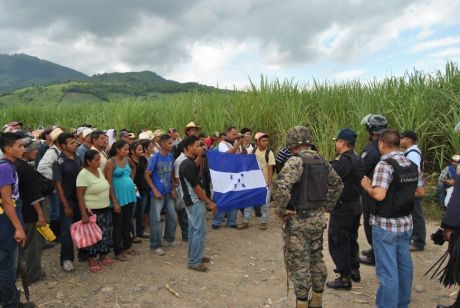Features
You are here
Keeping down the Honduran campesino

April 19, 2015
On January 25, 2015 a contingent of men with military-grade weapons shot over two dozen bullets into the offices of Via Campesina in the Honduran capital. It was nothing out of the ordinary—violence and intimidation has become commonplace for rural organizations in Honduras as the oligarchy attempts to silence the movement for land reform and food sovereignty.
Transnational capital depends on uprooting those closest to the land. In contrast to rural areas that have been fully swallowed by agribusiness, many Latin American campesino (peasant/landless farmer) organizations challenge the dominant narrative of markets, urbanization and development. They refuse to grow the handful of export crops demanded by agro-monopolies and commodity speculators; they lead resistance to GMO seed, extractive or tourism industries that seek to patent and commercialise the commons; and engage in civil disobedience to defend their right to the land—not for ideology, but dignity and survival.
This is why campesinos are being evicted, threatened and murdered in Honduras. Since the oligarchy-sponsored coup of 2009, the country’s descent into military-backed neoliberalism has been swift and violent. In addition to campesinos, there has been repression and targeted assassinations of indigenous, LGBT, and women’s rights activists, journalists, political opposition and many others critical of the post-coup regime. Commentary and analysis has outlined US complicity (led by Hillary Clinton and the Obama Administration) in working to legitimize the post-coup government, as well as Canada’s engagement to promote foreign investment.
Campesino organizations are targets because they are united and unrelenting in their struggle for alternatives to capitalist-driven uneven development that continues to be a disaster for the rural population of Honduras, 75 per cent of whom live on less than $1.25 per day.
History of coopted land reform
The current situation continues a history where wealthy elites repress any attempts at social-economic inclusion for the rural poor.
Like other countries in the region, through the 20th century Honduras was dominated by foreign-owned mining and plantation interests and ruled by military regimes. Production of coffee, bananas, cotton and cattle drove people off fertile land and proletarianised rural workers. Low wages and masses of unemployed rural workers led to a general strike in 1954 and demands for access to land.
In the 1950s, movements to regain land from the oligarchy were labeled communist and violently repressed. In 1962, following the Cuban Revolution, Honduras began official land reform under the US-sponsored Alliance for Progress, which many claim was moderate reform aimed at containing full scale-revolution. Fearful that plantation assets could be seized, US corporate interests pressured the Kennedy Administration to undercut land redistribution efforts in Honduras. It is argued this was a key factor precipitating the 1963 military coup, which led to the swift abandonment of the land reform process.
Through the 70s and 80s landless peasants resorted to illegal squatting and in some cases were granted land in the form of cooperatives and five-hectare family plots. However, to appease agribusiness, they were granted state-held lands (as opposed to expropriation of the more productive plantation lands) and required to produce specific export crops for predetermined buyers (so as to not undermine the export model). This brief period of modest reform ensured large landowners were untouched, only leading to further land concentration and inequality.
The IMF stipulated an Agricultural Modernization Law of 1992 aimed at “efficiency” and “increased production”, allowing previously granted land to be converted to enterprises and sold as individual plots. Critics say this was neoliberal counter-reform. What were previously constitutionally protected ejido communal lands, became privately owned by large investors. A then-new EU export deal meant large fruit growers were hungry for land and financial circumstances compelled many small holders to sell at low prices. Many are alleged to have sold collective or family plots to large companies without consent of cooperative membership or women in the households. Others were subject to coercion and violence on the part of large landholders. Whereas in the 70s and 80s, squatting on vacant land could eventually lead to title, in the 90s large government and landowners used military force to evict campesinos who had no access to a functioning judicial system.
For most of the 20th century, not only was land reform not achieved, but even modest attempts were co-opted in favour capitalist interests.
The 2009 capitalist coup
In 2008, President Manuel Zalaya began moving forward on the land reform process with a Decree that would grant titles to campesinos who had inhabited and worked land for more than 10 years. Zelaya also enacted other measures that enraged the ruling class, including a 60 per cent raise in the minimum wage, and a proposed new mining law requiring stricter environmental regulations, higher royalties and community consent.
These measures came to a halt in June, 2009—with military patrols, tanks and aircraft overhead; electricity, phone lines and media cut; armed forces stormed the home of Zalaya and put him on a plane to Costa Rica. All Latin American countries, the EU and much of the world condemned the coup, with the exception of Canada and the U.S.
The Clinton State Department worked behind the scenes to legitimize the coup on behalf of corporate interests. Canada was even less subtle in acting on behalf of investors, by helping rewrite the country’s mining laws (under the pretext of sustainability and CSR) and signing a bilateral trade agreement with the post-coup government—measures consistent with the new paradigm of Canadian foreign policy where “diplomatic assets of the Government of Canada will be marshaled on behalf of the private sector.” (Global Markets Action Plan, 2013)
The coup government privatized utilities and infrastructure; privatized education as part of a broader attack on the teacher’s unions, and undermined labour laws. It devised “Model Cities”, the brainchild of advisors with ties to the former Reagan Administration, as autonomous economic zones where the constitution would not apply. It granted hundreds of hydroelectric and mining concessions, mainly to US, Chinese, and Canadian investors.
Rural compesino and indigenous groups have been at the forefront of resistance to the coup and subsequent commercialization of Honduran territory. The consequence has been executions, forced disappearances, torture, death threats, attacks, and harassment.
In the words of Jesuit Father Ismael Moreno, “The campesinos and their worker organizations are identified by the business and political elites as a threat, or even an enemy…. They (elites) never achieved a land distribution that you might call ‘a countryside without campesinos’, a countryside for the agroindustrial projects, a countryside for the interests of national and multinational investors, where campesinos are just cheap labor not citizens with the right to more than a job, but to cultivate the land and decide how their product is sold. For these reasons, land is a decisive factor in the crisis in Honduras. When campesinos organize, it is precisely to demand land.”
Auctioning-off justice
In addition to public services and natural resources, the justice system and use of military force are available to the highest bidders. The US-funded Honduran military has been granted more legal powers than any other in Latin America. Corruption of the Supreme Court and armed forces was used to justify the 2009 coup through arcane, hypocritical legal arguments. The military has since violently repressed peaceful protest and opposition and, together with private security guards, are paid by companies to evict groups from land. Rich and powerful narco-capitalists like Miguel Facussé fund paramilitary death squads against campesinos. A 2009 UN panel found paramilitaries and mercenaries from Colombia and other neighboring countries were hired to support the coup and protect large landowners.
In addition to violence with complete impunity, the state uses arbitrary detention to detain campesinos who resist land grabs. They have no access to due process since courts and high offices continue to be illegally stacked. Since November 2013, about 60 judges have been suspended or dismissed without cause. In other words, if their rulings fail to favour those in power they can simply be dismissed. Moreover, many legal professionals and journalists exposing corruption in the justice system have been murdered.
The corrupted justice system has led to Honduras having the highest homicide rate and created a breeding ground for drug trafficking and organized crime. Like Mexico, this has been the pretext for US expanding military funding and air bases in Honduras.
Conclusion
Land and commodities have been key drivers in the history of rural dispossession and military coups in Honduras. A number of factors can explain why the oligarchy once again wants campesinos off the land: high demand for Palm Oil due to renewable fuel targets in US and EU; growing global appetite for food and commodities; acceleration of free trade agreements; and an influx of drug money that needs to be invested.
Campesino and indigenous groups that have struggled to gain even modest land holdings are once again being dispossessed and kept down by the plutocracy.
If you like this article, register for Rage Against the System, a weekend conference of ideas to change the world, April 24-26 in Toronto. Sessions include “Imperialism and resistance,” “Colonialism and indigenous resistance,” and “Festival of the oppressed: the Russian Revolution”
Section:










